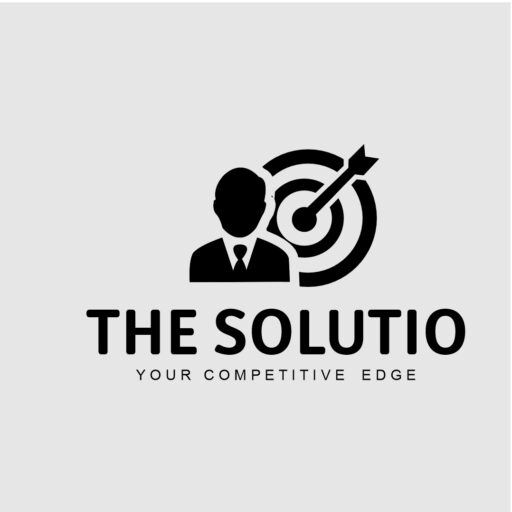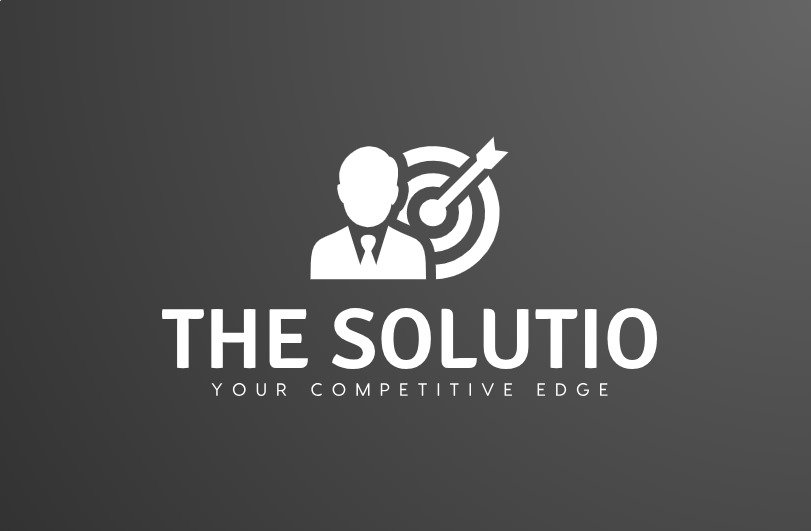Table of Contents
In today’s fast-paced digital landscape, businesses are constantly seeking ways to enhance efficiency, reduce operational costs, and improve customer engagement. One of the most transformative tools to emerge in recent years is this. This technology not only streamlines repetitive tasks but also empowers businesses to deliver personalized experiences at scale. In this blog, we’ll explore the multifaceted benefits of marketing automation and why adopting it is no longer a luxury but a necessity for modern businesses.
What is Marketing Automation?
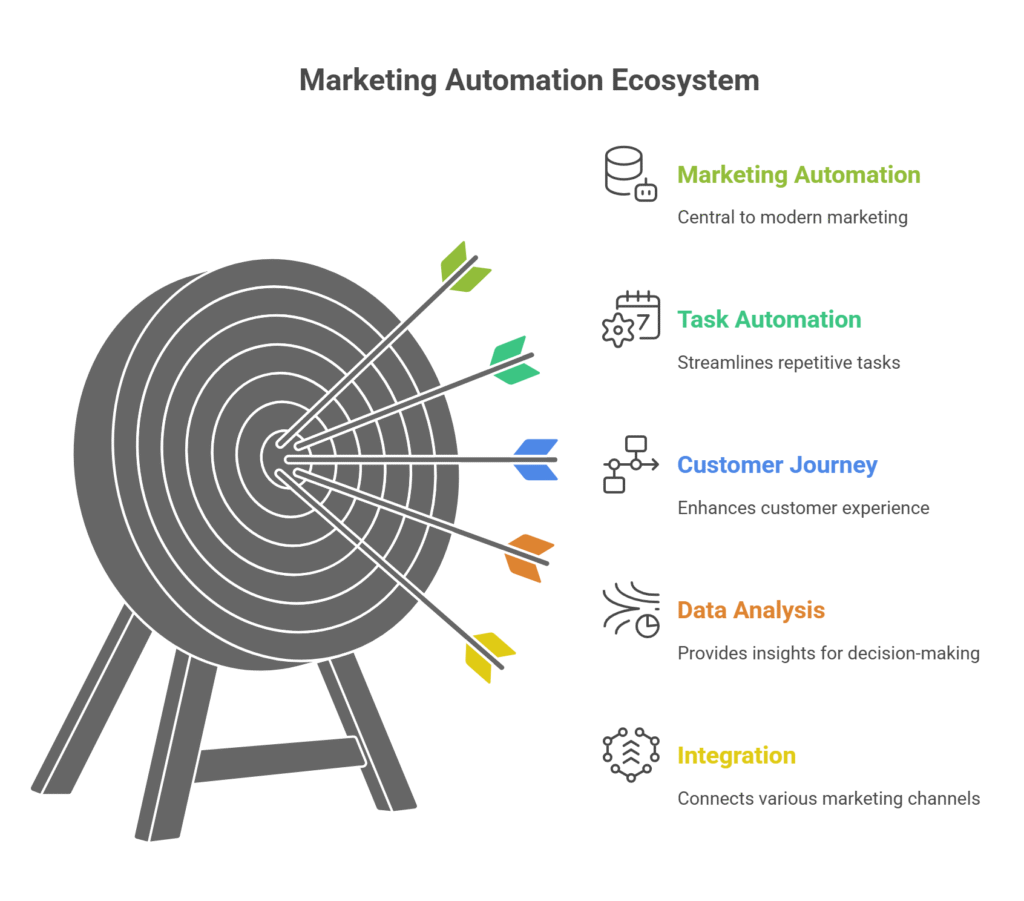
Marketing automation refers to the use of software and technology platforms to streamline, automate, and measure marketing tasks and workflows. These systems are designed to enhance the efficiency and effectiveness of marketing efforts, allowing teams to focus on more strategic initiatives such as planning, innovation, and customer experience management.
In its simplest form, marketing automation handles repetitive and time-consuming tasks such as sending emails, managing social media posts, scheduling campaigns, tracking user interactions, and scoring leads. However, in its more advanced implementation, it goes much further—enabling businesses to build comprehensive customer journeys, personalize user experiences at scale, and analyze data to make smarter, faster decisions.
The modern buyer’s journey is complex and multi-channel. Potential customers interact with businesses through various digital touchpoints including websites, emails, mobile apps, search engines, and social media platforms. Manually managing these touchpoints in a personalized and consistent way can be overwhelming. This is where marketing automation becomes invaluable.
By integrating marketing automation tools, businesses can create dynamic workflows that respond in real-time to customer actions. For example, when a user signs up for a newsletter, the system can automatically send a welcome email, offer a product demo, or prompt them to follow the company on social media. If that user then clicks on a specific product link, they can be added to a targeted campaign that provides more details or offers related products. All of this happens automatically, without human intervention, yet appears completely personalized to the user.
One of the most powerful aspects of is its ability to unify disparate marketing channels into a single ecosystem. Businesses no longer need to manage separate tools for email marketing, social media, customer relationship management (CRM), and analytics. Platforms such as HubSpot, Mailchimp, Marketo, ActiveCampaign, Salesforce Pardot, and others consolidate these features, giving marketers a 360-degree view of the customer journey and real-time control over their campaigns.
Moreover, these platforms allow for robust data collection and analysis. By tracking every interaction—from email opens and website visits to social media clicks and form submissions—marketers can gain deep insights into user behavior. This data is then used to segment audiences more accurately, craft highly relevant messaging, and forecast future trends. In essence, marketing automation helps move away from the “spray and pray” model of marketing to a more data-driven, targeted approach.
Another major benefit is lead scoring and nurturing. With automation, leads are scored based on their level of engagement and likelihood to convert. High-scoring leads can be passed directly to the sales team, while those not yet ready to buy can be nurtured through automated email sequences and educational content. This ensures that every lead is handled appropriately, reducing wasted effort and improving conversion rates.
Additionally, marketing automation tools often include A/B testing, performance analytics, real-time dashboards, and integration with third-party platforms such as CRMs, e-commerce stores, and webinar tools. These capabilities make it easier for businesses to optimize campaigns continuously, adapt strategies based on performance data, and scale operations without adding more personnel.
In today’s hyper-connected and competitive digital world, businesses that rely solely on manual marketing processes risk falling behind. Consumers expect instant responses, personalized recommendations, and seamless experiences. Marketing automation empowers businesses to meet these expectations consistently while maximizing their return on investment.
Whether you’re a small business looking to scale or a large enterprise aiming to refine your customer journey, marketing automation is a critical component of modern marketing infrastructure. It’s not just about saving time—it’s about elevating the entire customer experience and positioning your brand as one that understands and meets the needs of today’s digital-savvy consumer.
1. Enhanced Efficiency and Time Savings
One of the most immediate benefits of this is the ability to save time by automating repetitive tasks. Activities such as sending follow-up emails, updating contact lists, or scheduling social media posts can consume valuable time and resources if done manually.
With this, these tasks can be executed automatically based on predefined triggers or user behaviors. For instance, when a customer downloads an eBook, an automated workflow can be initiated to send a thank-you email followed by a series of nurturing messages. This improves speed and consistency in communication without requiring manual intervention.
2. Personalized Customer Experiences at Scale
Today’s consumers expect personalized interactions. They don’t want to receive generic messages that don’t align with their interests or behavior. It allows businesses to deliver hyper-personalized content to their audience by segmenting customers based on their actions, preferences, and engagement history.
Whether it’s personalized email content, product recommendations, or retargeted ads, marketing automation helps businesses engage with each customer in a meaningful and relevant way. This not only boosts customer satisfaction but also improves conversion rates.
3. Lead Nurturing and Scoring
One of the most critical aspects of digital marketing is turning prospects into paying customers. It enables businesses to nurture leads by sending them the right message at the right time. Through lead scoring mechanisms, it becomes easier to identify which prospects are sales-ready based on their interactions with your brand.
Automated workflows can guide leads through the buyer journey — from awareness to consideration to decision-making. As a result, sales teams receive more qualified leads, which increases the chances of closing deals faster.
4. Improved ROI and Reduced Costs
Investing in marketing might seem costly at first glance, but it delivers excellent ROI over time. By automating workflows, businesses can reduce manual labor costs, minimize human errors, and maximize marketing performance.
Moreover it platforms provide detailed analytics that help marketers measure the effectiveness of campaigns. These insights enable teams to optimize strategies, allocate budgets more efficiently, and generate higher returns from each campaign.
5. Consistent Multi-Channel Marketing
In the digital era, customers interact with brands across multiple channels — websites, emails, social media, search engines, and more. Managing a consistent brand presence across all these touchpoints can be daunting without automation.
It ensures that messages remain consistent and timely across all channels. Whether it’s a welcome email, a cart abandonment reminder, or a targeted Facebook ad, automation keeps your marketing cohesive and customer-focused.
6. Smarter Customer Segmentation
Segmentation is key to any successful marketing strategy. Instead of treating your audience as a monolithic group, it enables you to divide them into smaller segments based on demographics, behaviors, interests, and past purchases.
With these insights, businesses can craft targeted messages that resonate more effectively with each segment. For example, first-time visitors can receive introductory offers, while repeat customers might get loyalty rewards. This level of personalization is difficult to achieve manually but seamless with automation.
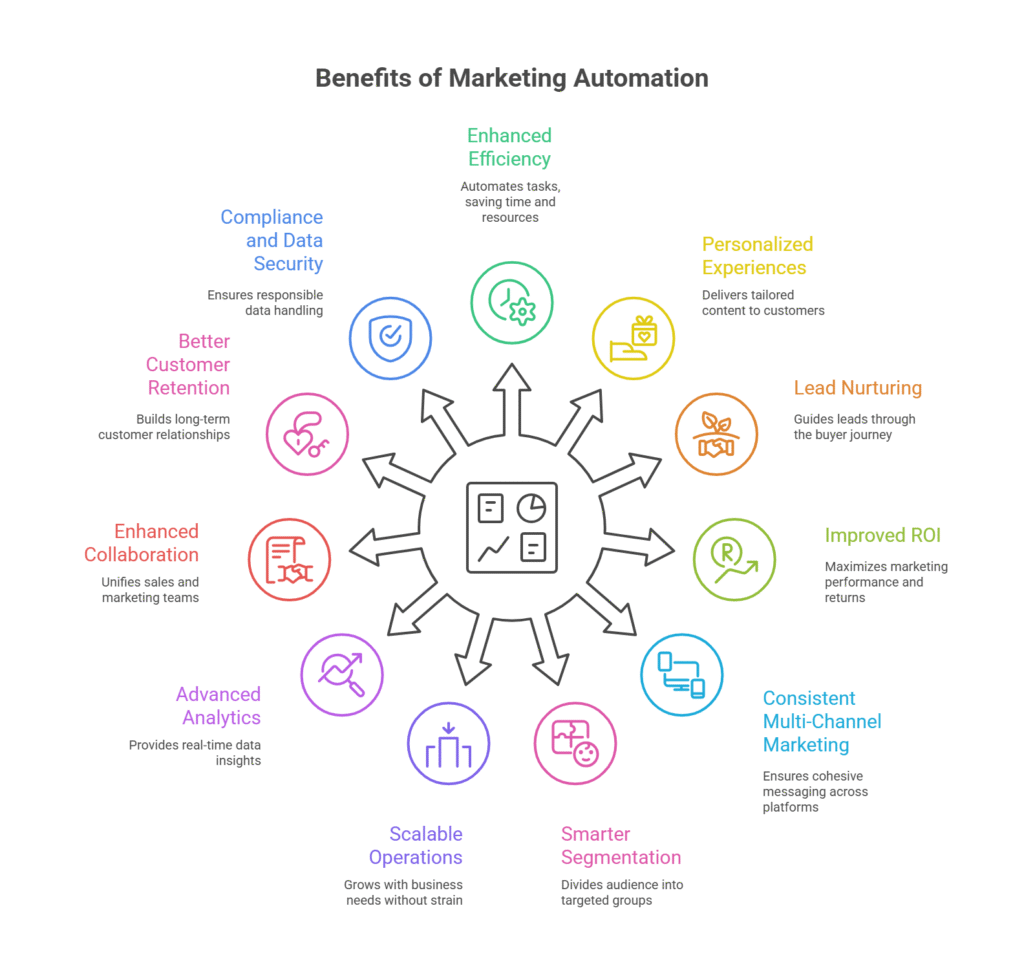
7. Scalable Marketing Operations
As your business grows, so does the complexity of your marketing efforts. It provides a scalable solution that grows with you. Whether you have 100 or 100,000 contacts, automation tools can manage campaigns efficiently without additional strain on your team.
This scalability is especially beneficial for startups and small businesses that aim to punch above their weight without hiring a large marketing team. With the right automation strategy, they can compete with larger enterprises in delivering personalized, high-quality marketing experiences.
8. Advanced Analytics and Reporting
Another significant advantage of marketing automation is access to in-depth analytics. These platforms track user behavior, email open rates, click-through rates, social media engagement, and more — all in real-time.
These analytics help marketers understand what’s working and what needs improvement. With data-driven insights, businesses can make smarter decisions, fine-tune their campaigns, and ultimately achieve better results.
9. Enhanced Collaboration Between Sales and Marketing
The gap between sales and marketing teams is a common challenge in many organizations. Marketing automation fosters better collaboration by providing a unified platform for both teams to access data and insights.
Automated lead scoring, CRM integration, and real-time tracking allow sales teams to see which leads are most engaged. This alignment ensures that no opportunity is missed and improves the overall efficiency of the sales funnel.
10. Better Customer Retention and Loyalty
While acquiring new customers is important, retaining existing ones is even more valuable. Marketing automation enables businesses to stay connected with their customers through personalized follow-ups, feedback surveys, birthday greetings, and loyalty programs.
These small but meaningful gestures contribute significantly to customer satisfaction and retention. Automated communication helps build long-term relationships and transforms one-time buyers into loyal brand advocates.
11. Compliance and Data Security
In an age of increasing data regulations (like GDPR and CCPA), businesses must ensure that customer data is handled responsibly. Marketing automation tools often come with built-in features to manage consent, preferences, and data protection.
This not only helps maintain compliance but also builds trust with customers who are increasingly concerned about how their data is used.
Final Thoughts: Embracing the Future with Marketing Automation
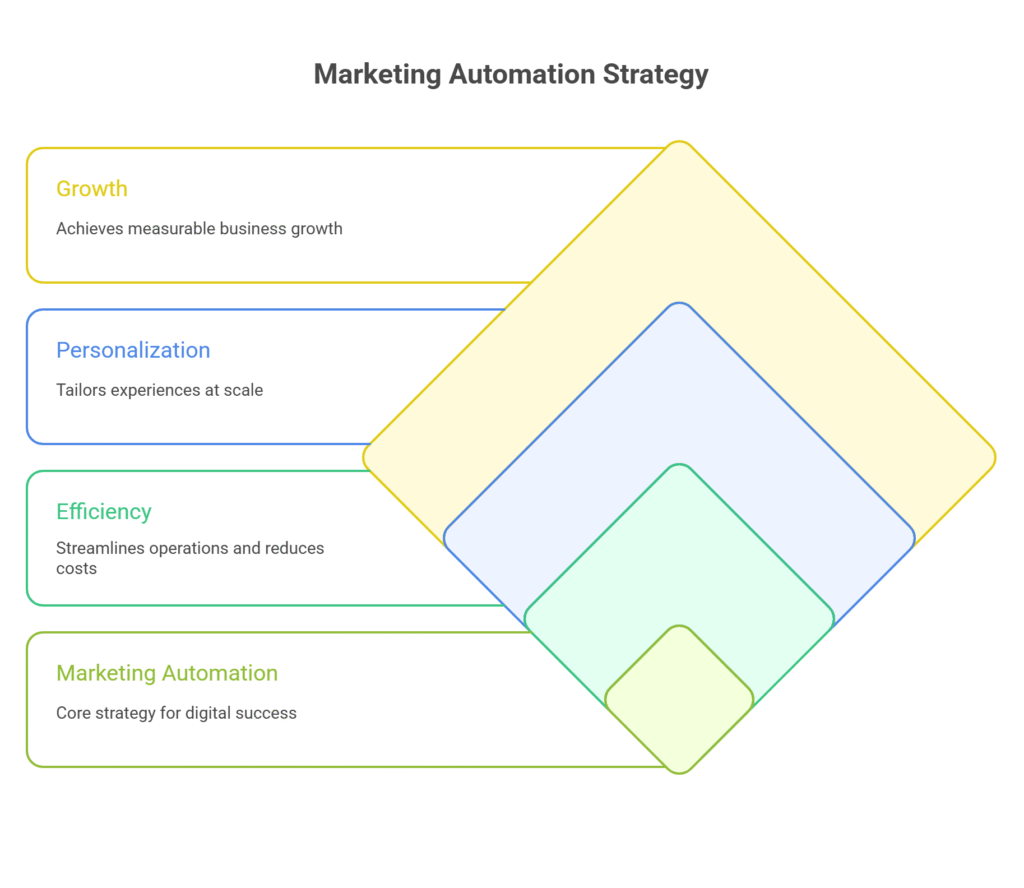
In summary, marketing automation is not just a trend — it’s a strategic imperative for any business that wants to thrive in the digital world. It brings together the power of technology, data, and creativity to deliver impactful marketing experiences while saving time, reducing costs, and improving ROI.
From small startups to large enterprises, businesses across all industries can benefit immensely from integrating marketing automation into their digital strategy. It’s a game-changer that empowers marketers to do more with less, personalize at scale, and achieve measurable growth.
Whether you’re looking to nurture leads, increase engagement, or streamline operations, now is the time to invest in marketing automation and future-proof your business.
Why Choose The Solutio – The Best Digital Marketing Agency in Bareilly?
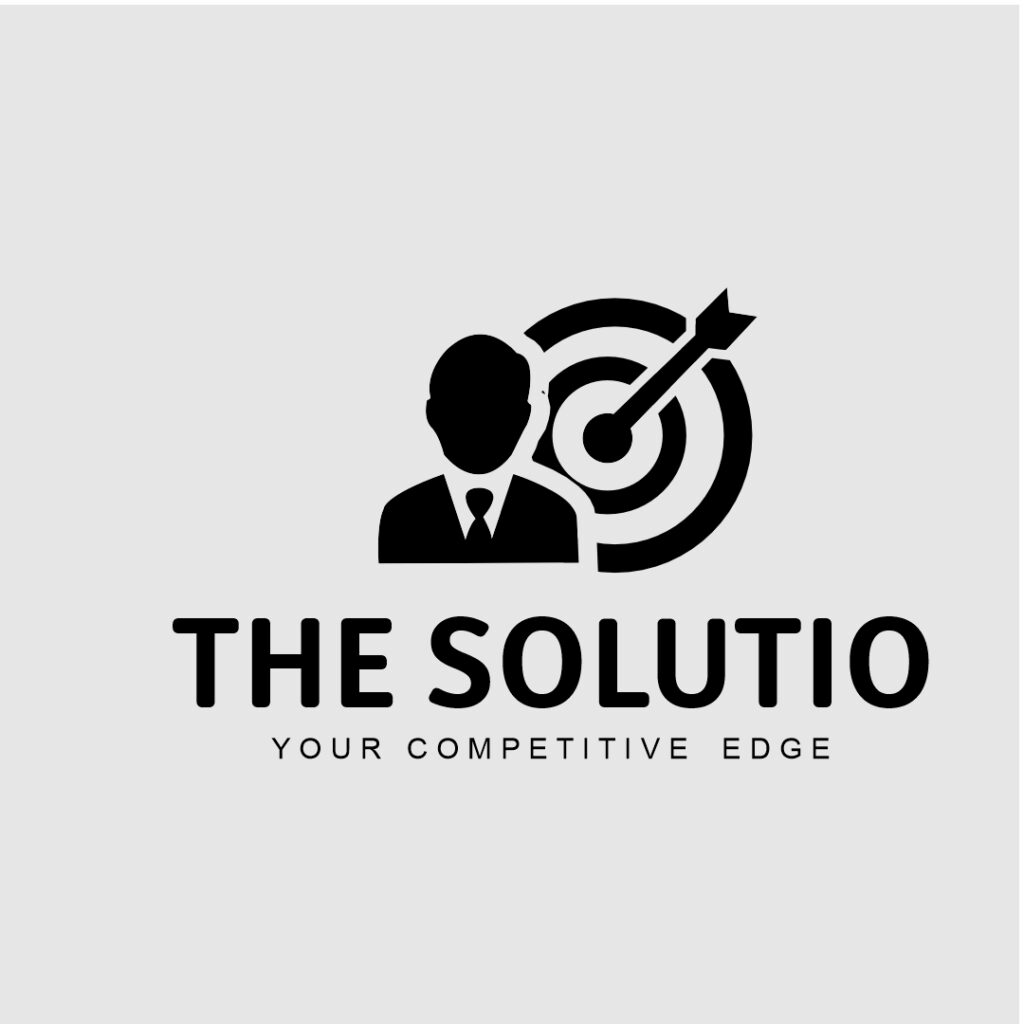
If you’re looking to implement marketing automation and elevate your digital marketing efforts, look no further than The Solutio – Bareilly’s most trusted digital marketing agency. With a team of seasoned professionals and a client-centric approach, The Solutio delivers tailored marketing solutions that drive results.
From SEO and content marketing to paid ads and CRM integration, The Solutio specializes in leveraging marketing automation to boost brand visibility, generate qualified leads, and improve conversion rates. Their hands-on experience across industries and data-driven strategies ensure that your business not only keeps up with the digital world but stays ahead of the curve.
Let The Solutio be your growth partner in the digital age. Visit www.thesolutio.in to learn more about how their services can transform your marketing journey.
